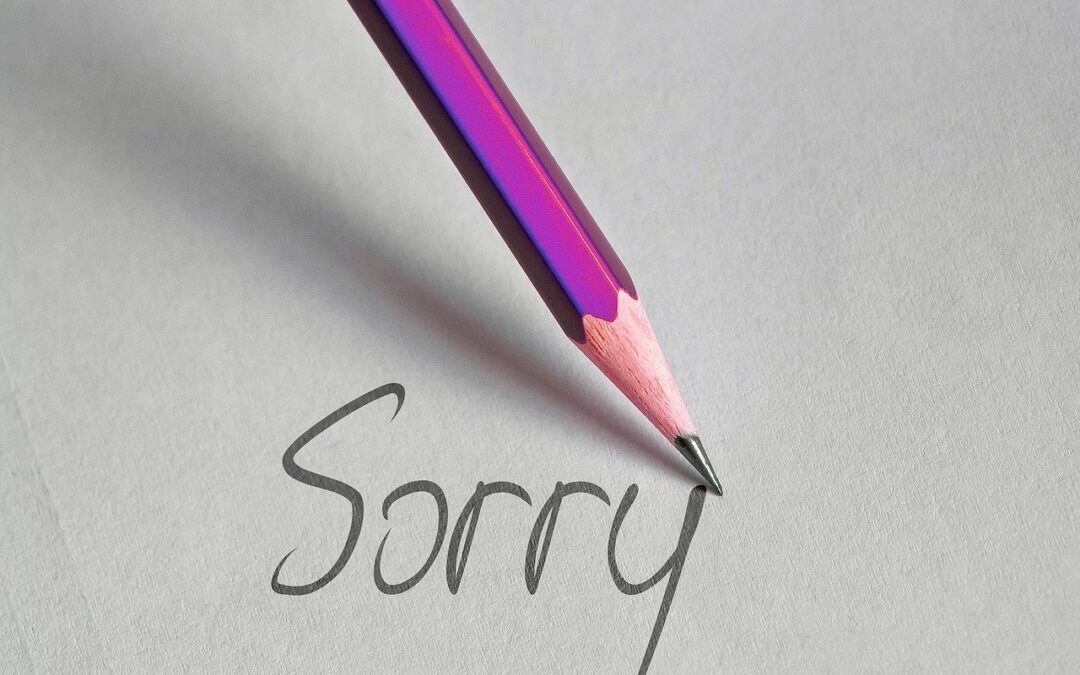We all mess up. We all forget things. We all overlook something important to others. We all say things without thinking. At work, the impacts of these can may be minor—causing a bit of inconvenience or irritation. The impacts can also cost time and money. While not pleasant, apologies for these things seem easy to make.
However, sometimes even at work our words and behaviors cause us shame and others to be wounded. The strength and mixture of powerful emotional experiences cause many of us to avoid what would help the most…A simple, sincere apology for our part of whatever transpired.
Why are these situations so hard? First, both sides have likely contributed. In work situations, this is quite common though both sides are blind to or downplay their own role. Admitting to oneself that they have inadvertently caused pain to another holds us back. It doesn’t fit our self-image—after all, we’re a good person and good people simply don’t do that! Or, I didn’t mean it, so why are they reacting that way?
Second, even when we do see our contribution, we can feel so certain that what THEY did was way worse than what WE did—so we deserve an apology first. Call it pride, call it “armoring up” but the refusal to give others an apology is all too common.
Lastly, to offer an apology can feel like we are baring our soul–humbling ourselves to the point of dangerous vulnerability. Furthermore, there is a risk that the other person may not reciprocate.
I have seen (and felt) the power of a real, honest apology and I’ve seen (and felt) the impact of one done poorly. And I can tell you, those done poorly-or half-heartedly– only make things worse. Done right, however, I have witnessed months of conflict resolved when one party finally apologizes. I have seen distrust, anger, blame, and frustration begin to melt away when one person finally stepped up to apologize humbly.
It takes real courage, which is one of the key personality related variables necessary for senior leadership. And that is vulnerability at its finest. If you have reason to make an apology—for minor or more serious reasons, Psychology Today printed an article about how to make your apologies count.
- A true apology does not include the word “but” (“I’m sorry, but …”).“But” automatically cancels out an apology, and nearly always introduces a criticism or excuse.
- A true apology keeps the focus on your actions—and not on the other person’s response. For example, “I’m sorry that you felt hurt by what I said at the meeting yesterday,” is not an apology. Try instead, “I’m sorry about what I said at the meeting yesterday. It was insensitive and uncalled for.” Own your behavior and apologize for it, period.
- A true apology does not overdo. It stays focused on acknowledging the feelings of the hurt party without overshadowing them with your own pain or remorse.
- A true apology doesn’t get caught up in who’s to blame or who “started it.” Maybe, you’re only 14% to blame and maybe the other person provoked you. It can still help to simply say, “I’m sorry for my part in this.”
- A true apology needs to be backed by corrective action. If your coworkers mentions you didn’t respond to a request for information, apologize and let her know when you will get her the information she asked for.
- A true apology requires that you do your best to avoid a repeat performance. Obviously, it doesn’t help to apologize with a grand flourish and then continue the very behavior you apologized for. Passionate expressions of remorse are empty if you don’t put sincere effort into ensuring that there is no repeat performance.
- A true apology should not serve to silence another person (“I said I’m sorry at least 10 times, so why are you still bringing up the affair?”). Nor should an apology be used as a quick way out to get yourself out of a difficult conversation or dispute.
- A true apology should not be offered to make you feel better if it risks making the hurt party feel worse. Not all apologies are welcome. Making amends may be part of your healing process but find another way to heal if the other person doesn’t want to hear from you.
- A true apology recognizes when “I’m sorry” is not enough. A serious hurt or betrayal requires repair work overtime to restore trust.
Do you feel the need to make an apology for something? I’ve been there, done that. You can do it, we can help; give me a call.





